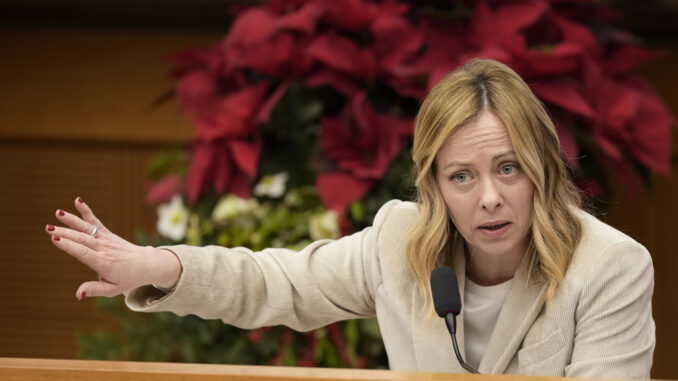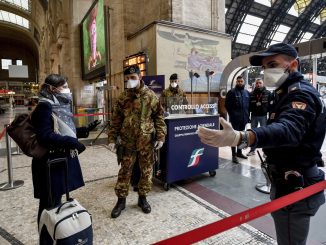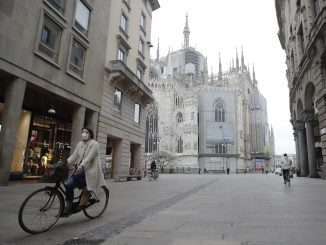
ROME — Italian Prime Minister Giorgia Meloni told her European Union partners Thursday that curbing migration flows from African countries has less to do with offers of charity than strong partnerships coupled with strategic investments in those nations.
Meloni told reporters at a year-end news conference that last month’s deal on the EU’s Migration and Asylum Pact partially improved the situation for Italy and other asylum countries, but does not represent a solution to increasing migrant arrivals.
“What needs to be done in Africa is not charity,” she said. “What needs to be done in Africa is to build cooperation and serious strategic relationships as equals, not predators.”
Meloni also stressed the need “to defend the right not to have to emigrate … and this is done with investments and a strategy.”
Reforms EU leaders agreed on last month are based on a new set of regulations governing how member states respond to people arriving in Europe. The deal has been harshly criticized by humanitarian groups, saying it will diminish the rights of people on the move.
Meloni also said that supporting Africa’s development and the dangers posed by artificial intelligence (AI) will be among the key themes for Italy during its one-year presidency of the Group of Seven (G7), which Rome took over at the start of January.
Italy outlined its proposed strategy in Africa in the so-called Mattei Plan — named after Enrico Mattei, founder of state-controlled oil and gas giant Eni — which seeks to expand cooperation beyond energy.
Meloni said the plan includes specific projects, but stopped short of providing details, adding they will be unveiled in the coming weeks.
The Italian leader admitted that results in tackling illegal migration — one of the top priorities of her far-right coalition government — are so far disappointing.
Meloni’s government garnered criticism by aid groups and left-wing opposition parties after approving harsher immigration laws, restrictions on sea rescue operations and plans to build migrant reception centers in Albania. But her electoral promises to stop massive migration flows to Italy have been mostly unfulfilled.
In 2023, the path from North Africa across the central Mediterranean to Italy became Europe’s busiest migration route.
According to the UNHCR, a total of 260,662 people have crossed the Mediterranean Sea from Northern Africa to Europe since the beginning of 2023.
Data from Italy’s Interior ministry showed the migrant arrivals in Italy jumped 50% in 2023 from the previous year. About 155,750 migrants reached Italian shores last year, including more than 17,000 unaccompanied minors, compared to 103,850 in 2022.
“The data on migration are not satisfying, especially considering the amount of work we dedicated to that,” Meloni said, adding that she would continue to work with African countries to prevent illegal migrant departures.
“My goal is to work in Africa, block the departures in Africa, evaluate the possibility to open up hot-spots there to establish who has the right and who does not to come to Europe,” Meloni added. “At the same time we’ll work on legal migration.”
The Italian premier also addressed other hot international topics, clarifying Rome’s position on the Israel-Hamas war.
“I think it would be an error to say ‘First we destroy Hamas and then we’ll talk,” Meloni said regarding the future of the Palestinians in Gaza. “Because one of the most effective tools for exposing Hamas, who does not have any interest in the Palestinian cause, is to work on a serious structural solution for the Palestinian problem.”
Responding to possible risks of Italy’s isolation in Europe, after last month its parliament rejected a motion to ratify the European Stability Mechanism (ESM) reform that aims at strengthening the system’s powers to supervise troubled countries, Meloni called this tool “obsolete.”
She added that Italy’s failure to ratify a reform of the fund could turn into an opportunity to make it “more efficient.”
Italy remains the only EU country that failed to ratify the treaty, which cannot be implemented without approval by all national parliaments.



